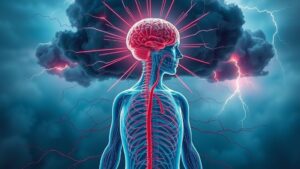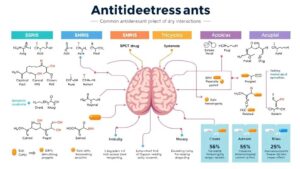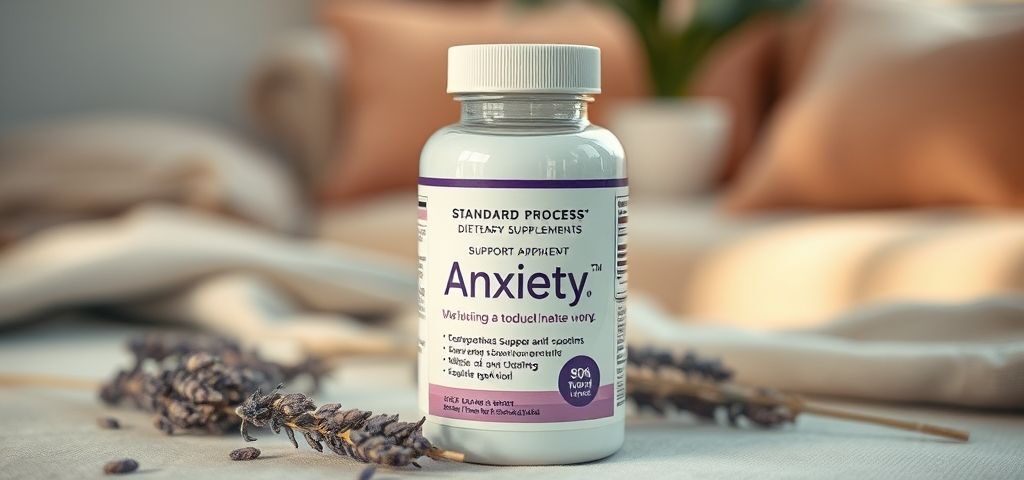Anxiety has become an increasingly common challenge in today’s fast-paced world. While therapy, mindfulness, and lifestyle changes play essential roles in managing anxiety, many people are also turning to natural supplements to support their nervous system. Among the most trusted names in whole-food-based nutrition is Standard Process, a company known for producing high-quality, holistic supplements that support health from the inside out. Standard Process Supplement for Anxiety
But with a wide range of products available, you might wonder: What’s the best Standard Process supplement for anxiety? In this in-depth guide, we’ll explore how Standard Process supports mental wellness, which specific supplements are most effective for anxiety relief, and how to incorporate them into your daily life.
Understanding Anxiety from a Holistic Viewpoint
Anxiety is more than just a mental health issue—it’s a whole-body experience. It affects your digestion, heart rate, hormone levels, sleep, and energy. From a holistic perspective, anxiety often stems from imbalances in the nervous system, adrenal glands, and gut-brain connection.
Some root causes may include:
Nutrient deficiencies (magnesium, B vitamins, calcium)
Overactive adrenal glands from chronic stress
Poor sleep quality and circadian rhythm disruption
Blood sugar instability
Hormonal imbalances (especially in women)
To truly support the body in reducing anxiety, we must nourish the nervous system, regulate stress hormones, and restore cellular balance.
That’s where Standard Process supplements come in.
What Makes Standard Process Different?
Standard Process is not your average supplement brand. Founded in 1929, the company has a unique approach to health rooted in whole-food nutrition and organ-specific support.
Key features:
Farm to supplement: Ingredients grown on their certified organic farm in Wisconsin
Whole-food-based formulas: Not synthetic vitamins—real food concentrates
Phytonutrient-rich: Supports natural detoxification, hormone balance, and cellular repair
Organ-targeted formulas: Blends that support specific organs like the adrenals, thyroid, liver, and nervous system
When choosing a supplement for anxiety, quality and bioavailability matter, and Standard Process leads in both.
Top Standard Process Supplements for Anxiety
Let’s explore the best Standard Process supplements known to help ease anxiety naturally. Each one supports a different system involved in the anxiety response.
Min-Tran
Primary benefit: Calms nervous system, reduces tension, and supports restful sleep.
How it works:
Min-Tran is a blend of calcium, magnesium, and sea kelp—a mineral-rich formula that calms the central nervous system. Magnesium and calcium are crucial for nerve signaling and muscle relaxation.
Supports the parasympathetic (calming) nervous system
Helps reduce muscle tension and physical symptoms of anxiety
Promotes better sleep quality
Best for: General anxiety, racing thoughts, tight shoulders, and insomnia.
Cataplex G
Primary benefit: Nourishes nerves and balances emotional reactivity.
How it works:
Cataplex G includes B vitamins, particularly B6 and B12, which are essential for neurotransmitter production. It’s designed to improve nerve impulse conduction and reduce “nerve fatigue.”
Promotes calm mental focus
Supports nerve health and blood flow to the brain
Helps regulate mood swings and irritability
Best for: Overwhelm, brain fog, emotional reactivity.
Drenamin
Primary benefit: Supports adrenal gland health and reduces stress-induced fatigue.
How it works:
Drenamin is a powerhouse blend of vitamin C, B vitamins, adrenal glandulars, and antioxidant-rich ingredients that help regulate cortisol (the stress hormone).
Improves adrenal resilience
Helps reduce a “wired and tired” feeling
Boosts energy and mental clarity
Best for: Burnout, chronic stress, fatigue, and tension.
Nevaton Forte (by MediHerb, distributed by Standard Process)
Primary benefit: Stabilizes mood and supports serotonin pathways.
How it works:
Nevaton Forte combines herbal ingredients like St. John’s Wort, Schisandra, and Skullcap. These herbs support serotonin, calm the mind, and reduce nervous system excitability.
Supports emotional balance
Acts as a natural antidepressant
Useful for mild to moderate anxiety and low mood
Best for: Mood imbalance, emotional sensitivity, sadness, or irritability.
Adrenal Complex
Primary benefit: Comprehensive adrenal support for stress recovery.
How it works:
Contains whole adrenal glandulars, vitamins, and minerals to rejuvenate overworked adrenal glands. When your adrenals are fatigued, anxiety and panic can become more frequent.
Restores adrenal hormone balance
Helps the body adapt to stress more effectively
Boosts immune and energy levels
Best for: Long-term stress, panic attacks, and hormonal anxiety.
The Role of the Nervous System and Stress
The autonomic nervous system has two main branches: the sympathetic (fight-or-flight) and parasympathetic (rest-and-digest) systems. Anxiety often stems from being stuck in overdrive.
Standard Process products like Min-Tran and Cataplex G gently shift the body from a chronic stress state into a more balanced, parasympathetic one.
In this calmer state:
Breathing slows
Digestion improves
Sleep becomes more restful
The mind becomes quieter

How to Choose the Right Supplement for Your Anxiety Type
Here’s a quick guide:
| Anxiety Symptom | Recommended Supplement |
| Racing mind | Min-Tran |
| Emotional outbursts | Cataplex G or Nevaton Forte |
| Chronic stress fatigue | Drenamin or Adrenal Complex |
| Trouble sleeping | Min-Tran |
| Hormonal or PMS anxiety | Nevaton Forte + Drenamin |
| Panic attacks | Adrenal Complex + Min-Tran |
Stacking Supplements: Can You Take More Than One?
Yes, many Standard Process supplements are designed to work synergistically. Anxiety often responds best to a multi-system approach, supporting the nervous system, adrenal glands, and mood all at once.
Example stack:
Morning: Drenamin + Cataplex G
Afternoon: Nevaton Forte
Evening: Min-Tran before bed
Always consult with a healthcare provider or a functional medicine practitioner before stacking more than two to three supplements, especially if you’re pregnant, breastfeeding, or on medications.
Lifestyle Practices to Boost Results
Supplements work best when combined with healthy lifestyle choices:
Practice Mindfulness or Breathwork
Deep breathing activates the parasympathetic nervous system.
Limit Caffeine and Sugar
They overstimulate the nervous system and trigger anxiety in many people.
Create a Sleep Routine
Aim for 7–9 hours/night and go to bed at the same time every day.
Move Daily
Exercise helps discharge built-up adrenaline and increases feel-good chemicals.
Stay Hydrated
Dehydration can mimic anxiety symptoms like dizziness and palpitations.
Anxiety doesn’t have to control your life. With the right support from nature and a functional approach, you can reclaim your calm, clarity, and resilience. Standard Process supplements provide a holistic solution that aligns with your body’s natural healing processes.
Whether you need to soothe frazzled nerves, rebuild adrenal strength, or lift your mood, there’s a targeted formula ready to help you feel like yourself again.
Would you like a printable version of this post, a 7-day supplement guide, or a custom stack recommendation based on your symptoms? Just let me know!
Can I Take These Supplements Alongside Antidepressants or Anti-Anxiety Medications?
In today’s wellness-conscious world, many people seeking relief from anxiety and depression are combining conventional medications with natural supplements. If you’re one of the millions prescribed antidepressants (like SSRIs, SNRIs, or tricyclics) or anti-anxiety medications (such as benzodiazepines or beta-blockers), you may be wondering:
This blog dives deep into that exact concern.
We’ll explore:
Which supplements are generally safe to take with antidepressants
Which ones may interact or conflict?
How to combine both approaches wisely
What your doctor might not tell you—and what to ask them
Let’s equip you with facts, not fear, so you can make confident, informed choices.

Understanding the Two Sides of Mental Health Support
There’s no one-size-fits-all solution to mental health. Many people need medications for chemical stability, especially in acute or severe anxiety or depression. But more and more are discovering that supplements can enhance results, reduce side effects, or help wean off medications under supervision.
Here’s a breakdown:
| Conventional Medications | Natural Supplements |
| SSRIs, SNRIs, TCAs | Magnesium, B-vitamins, L-theanine |
| Benzodiazepines | Ashwagandha, Valerian Root |
| Mood stabilizers | Omega-3s, GABA, Rhodiola |
| Beta-blockers | Passionflower, L-Taurine |
The Concept of “Integrative Mental Health”
Supplements in integrative mental health serve as supportive tools—not replacements—working alongside evidence-based treatments to nourish the brain, balance mood, and enhance overall emotional resilience.
Reduce dependency on long-term pharmaceuticals (gradually)
Help manage side effects like insomnia, low libido, or brain fog
Address root causes like nutrient depletion or adrenal fatigue
Promote overall mind-body wellness
🧠 Think of supplements as gentle assistants that help your medications work better, not enemies of modern medicine.
Common Antidepressants and Their Interactions
Before diving into specific supplements, let’s cover the most prescribed antidepressants and how they function:
SSRIs (Selective Serotonin Reuptake Inhibitors)
Examples: Zoloft, Prozac, Lexapro
Function: Increase serotonin levels by preventing its reabsorption
Risk: Can interact with serotonin-boosting herbs or amino acids
SNRIs (Serotonin and Norepinephrine Reuptake Inhibitors)
Examples: Effexor, Cymbalta
Function: Affects both serotonin and norepinephrine
Risk: May interact with stimulating herbs or adaptogens
Tricyclic Antidepressants (TCAs)
Examples: Elavil, Tofranil
Risk: Can have strong side effects and are sensitive to interactions
MAOIs (Monoamine Oxidase Inhibitors)
Examples: Nardil, Parnate
Risk: High risk of food and supplement interactions
⚠️ Should only be taken with professional guidance
Benzodiazepines (Anti-Anxiety Drugs)
Examples: Ativan, Xanax, Valium
Function: Sedate the nervous system
Risk: Taking with other calming herbs or sedatives may intensify drowsiness

Supplements That Are Generally Safe with Antidepressants
While everyone’s biochemistry is unique, the following supplements are commonly used alongside medications with few risks when taken properly:
Magnesium (Glycinate or Citrate)
Function: Calms the nervous system, reduces muscle tension, aids sleep
Benefit: Supports serotonin production and may reduce SSRI-related insomnia
✅ Generally safe with all antidepressants
L-Theanine
Function: Found in green tea, promotes relaxed focus and reduces anxiety
Benefit: Can smooth out SSRI-induced agitation or tension
✅ Works well with SSRIs and benzodiazepines (but monitor for drowsiness)
B-Vitamins (Especially B6, B12, Folate)
Function: Crucial for neurotransmitter function and methylation
Benefit: Helps prevent drug-induced nutrient depletion
✅ Very safe and recommended alongside antidepressants
Omega-3 Fatty Acids (EPA & DHA)
Function: Reduce inflammation and improve mood regulation
Benefit: Shown to enhance SSRI effectiveness in studies
✅ Safe and effective when taken with most medications
Vitamin D3
Function: Acts as a hormone, critical for mood and brain function
Benefit: Helps address seasonal or chronic depressive symptoms
✅ Non-interactive with most medications
Rhodiola Rosea (Low-Dose)
Function: Adaptogen that balances cortisol and improves energy
⚠️ Use cautiously with SSRIs; may increase serotonin too much if overdosed
✅ Safe in low doses and short-term, preferably under supervision
GABA (Gamma-Aminobutyric Acid)
Function: Naturally calming neurotransmitter
⚠️ Do not combine with benzodiazepines unless guided by a provider
✅ Safe in moderate doses with SSRIs
Supplements That May Interact With Antidepressants
Certain natural remedies may seem harmless, but they can interfere with drug metabolism or serotonin levels, leading to serious complications.
⚠️ 1. St. John’s Wort
Used for mild depression
Major interaction risk with SSRIs, SNRIs, MAOIs
Can cause serotonin syndrome (dangerous overstimulation)
❌ Do not use with any antidepressant
⚠️ 2. 5-HTP (5-Hydroxytryptophan)
Boosts serotonin naturally
Can cause serotonin overload when combined with SSRIs
❌ Avoid unless supervised by a physician
⚠️ 3. SAM-e
Powerful mood booster and methyl donor
Risk of mania or serotonin overload with certain meds
❌ Avoid or use with extreme caution
⚠️ 4. Kava
Strong anti-anxiety herb
Can interact with benzodiazepines, causing excessive sedation or liver strain
❌ Best avoided with anti-anxiety prescriptions
How to Combine Safely: Best Practices
If you’re considering combining natural supplements with antidepressants or anti-anxiety medications, here’s how to do it right:
Talk to Your Prescribing Doctor or Psychiatrist
Share a complete list of supplements you take (even if they’re “just herbs”)
Ask if any known interactions exist for your specific medication
Work with a Functional Medicine or Holistic Practitioner
They can help guide a personalized plan that incorporates supplements without risks
Introduce One Supplement at a Time
Allows you to gauge reactions and adjust as needed
Wait 5–7 days between new supplements
Start With Low Doses
Especially important with adaptogens, calming herbs, or neurotransmitter precursors
Listen to Your Body
Note how you feel emotionally and physically
Watch for signs of overstimulation (headache, irritability, rapid heart rate)
Real-Life Scenario: Combining Supplements + Meds
Emily, a 32-year-old marketing manager, takes Lexapro (an SSRI) for anxiety and occasional depression. With her psychiatrist’s support, she adds:
Magnesium glycinate (200mg at night)
L-Theanine (100mg in the morning)
Omega-3 (EPA 1000mg daily)
Within three weeks, she notices:
Better focus
Calmer mornings
Less Lexapro-induced jaw tension
More restful sleep
This is a great example of a well-structured, supplement-enhanced medication routine.
Final Thoughts
Combining supplements with antidepressants or anti-anxiety medications can be both safe and effective when done intelligently. The key is understanding what you’re taking, why, and how each ingredient affects the body.
FAQs
Are Standard Process supplements safe for long-term use?
Yes, they are food-based and designed for ongoing nutritional support. However, it’s wise to periodically reassess with a healthcare provider.
How long before I see results for anxiety relief?
Many users notice improvements within 7–14 days, especially with Min-Tran and Drenamin. Deep nervous system repair may take longer, 4 to 8 weeks for full benefits.
Can I eventually stop my meds by taking supplements instead?
That depends on the severity of your condition. Some people gradually taper off medication under medical guidance while using supplements to support the transition. Never quit cold turkey.
Are supplements as effective as antidepressants?
For mild to moderate cases, some supplements (like Omega-3s, magnesium, and B-complex) have been shown to match medication efficacy in studies, but results vary.
Will I feel drowsy if I combine calming supplements with anti-anxiety meds?
Possibly. Combining sedatives like L-theanine, GABA, or valerian with benzodiazepines may increase drowsiness. Start small and avoid operating machinery until you know how you respond.

